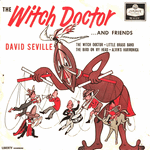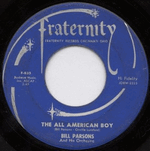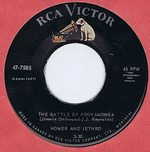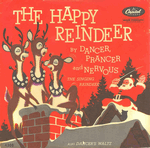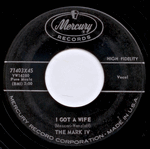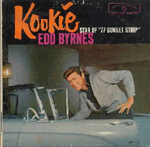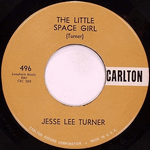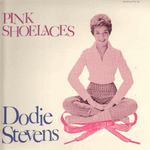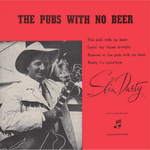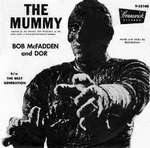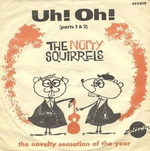Over 2000 One Hit Wonder Songs!!
Last Update 04/03/16

Novelty One Hit Wonders
- Artist
- David Seville
- Year
- 1958
- Song
- Witch Doctor
- Chart
- 1
David Seville was a stage name of Ross Bagdasarian, who wrote hits for several artists during the '50s. He later turned his attention to novelty recording. In 1958, his comedy singles "Witch Doctor", the first song to featured the high-pitched vocal of the Chipmunks, top the Billboard chart. It was the only hit that was credited under his name.
- Artist
- Bill Parsons
- Year
- 1959
- Song
- The All American Boy
- Chart
- 2
Unofficially the first record by Bobby Bare but credited to his friend, Bill Parsons. This surreal song about how a young boy who thought being a musician would made him an American - before Uncle Sam called him for his 'American' duty - became a surprise big hit in 1959. In 1962, Bare began recorded under his own name and later became a Country legend. Parsons himself released a couple of unsuccessful records before retired from music scene.
- Artist
- Homer & Jethro
- Year
- 1959
- Song
- The Battle of Kookamonga
- Chart
- 14
Homer D. Haynes and Jethro Burns were country-comedy musicians from Tennessee since the 1940s. In 1959, their parody version of Johnny Horton's hit "The Battle of Kookamonga" became a big hit and won a Grammy Award that year. They tried to carry on this success with strings of records but none came close to the success of that parody song. The duo continued to perform until Homer died in 1971.
- Artist
- Dancer, Prance & Nervous
- Year
- 1959
- Song
- The Happy Reindeer
- Chart
- 34
Russ Regan, the president of UNI Records, began his career as a composer and record producer in the late 1950s. In 1959, he recorded a children christmas song called "The Happy Reindeer" under the name 'Dancer, Prancer & Nervous' or 'The Singing Reindeer'. The song became a Top40 hit the same year. It was the only known hit by these fictional reindeer characters.
- Artist
- The Mark IV
- Year
- 1959
- Song
- I Got A Wife
- Chart
- 24
The Mark IV was a Chicago-based American music ensemble formed in the late 1950s. They got a break in 1959 with their novelty singles "I Got A Wife". The song about a husband and his bothersome wife became no.24 hit on Billboard pop chart that year. The band quickly followed up this success with more novelty records, but none could became a hit. They disbanded in 1980s.
- Artist
- Edward Byrnes & Connie Stevens
- Year
- 1959
- Song
- Make Yourself Comfortable
- Chart
- 4
Edward Byrnes (aka Edd Byrnes) was an American actor who was famous from his role as Gerald Lloyd "Kookie" Kookson III on the TV detective series "77 Sunset Strip". In 1959, he teamed up with an actress Connie Stevens to record a funny song "Kookie, Kookie (Lend Me Your Comb)" as a joke for his ducktail style haircut. The song went to no.4 that year. He never made another hit again.
- Artist
- Jesse Lee Turner
- Year
- 1959
- Song
- The Little Space Girl
- Chart
- 20
Jesse Lee Turner was an American singer from the small town of Bowling, Texas, who gained a brief fame before the end of 1950s. He suddenly appeared on national chart with an alien lover story "The Little Space Girl", which became an unexpected Top20 hit in 1959. However, all his following works failed to catch any attention and he soon vanished from the music scene ...as mysteriously as he came.
- Artist
- Dodie Stevens
- Year
- 1959
- Song
- Pink Shoe Laces
- Chart
- 3
A Chicago-born Dodie Stevens had been in singing business since she was young. At the age of 12, she was signed to Crystalette Records and released her debut in 1959. The novelty song "Pink Shoe Laces" became a no.3 hit on pop chart. She tried to follow this success but could not maintain her popularity. She retired from her performing career at the age of 16.
- Artist
- Slim Dusty
- Year
- 1959
- Song
- A Pub With No Beer
- Chart
- UK 3
Slim Dusty was definitely one of the most successful country artist ever come out of Australia. Despite penned a number of classics, only one of those actually made it to the European chart. His drunken novelty tune "A Pub With No Beer" became an unexpected international hit. Not only topped the Australian chart, but also climbed to Top5 position on British chart as well. It was the only time his name showed up on either side of the Atlantic till his death in 2003.
- Artist
- Bobby McFadden and Dor
- Year
- 1959
- Song
- The Mummy
- Chart
- 39
Robert "Bob" McFadden was a well-known American voice actor who voiced many cartoon characters since 1950s. He also had a one-time success in music when his novelty record "The Mummy", with Rod McKuen (credied as 'Dor'). The record managed to crack into Top40 chart in 1959. He continued to work until the late 1980s but could not produce another hit.
- Artist
- Nutty Squirrels
- Year
- 1959
- Song
- Uh! Oh! Part 2
- Chart
- 14
Nutty Squirrels was certainly the most successful of all the Chipmunks' imitative acts in the late '50s. The difference was that Nutty Squirrels preferred jazz music instead of pupular music style used by the Chipmunks. They managed to gnaw their name on the Billboard chart once with their nonsensecial jingle "Uh-Oh! (Part2)" in 1959. Sadly, they were discontinued after their follow-up records could not make the chart..
